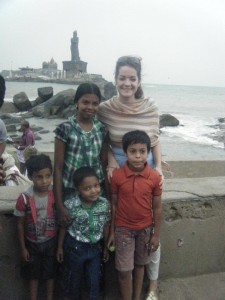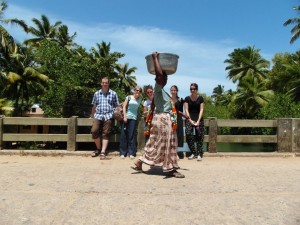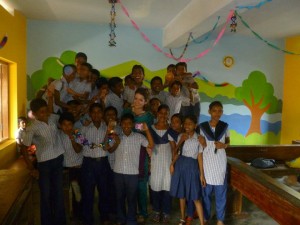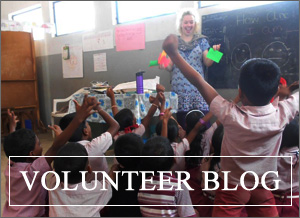As we have asked our Student Leaders to do interviews and provide advice for our volunteers we also thought that we should give you some of our advice as past volunteers ourselves. So this interview comes from myself and I hope you find it useful!!
I originally volunteered with VESL in September 2011 for three months in Kerala, following this I was very keen to go back and so led a team from Edge Hill University to India in the summer of 2012 for 6 weeks as part of the Student Leader Programme. I also briefly visited our projects in Sri Lanka & Thailand, visiting our volunteers and catching up with our Country Managers. On return from my overseas trip I became Programme Manager and will be doing VESL’s overseas visit this year.
What is the one thing you wouldn’t go overseas without?
This is a tough question, and I have managed to narrow it down to three things:
1) String – when I first saw this on the VESL packing list I wondered how on earth string could be useful, but it is, now a trusty ball of string travels with me every time I go overseas. Why you may ask? String is useful for putting up a mosquito net, making a temporary washing line in your room (or outside) and for use when teaching (measurement stick, to hang things on in the classroom etc).
2) Tiger balm – honestly one of the best things to include in your toiletries, pop it on any mosquito bite (that is not open) and it will instantly stop itching. Also good if you have a blocked nose or you have to walk past a particularly smelly part of the village on your way to school!! It is also useful for headaches, muscles aches and spots.
3) My kindle – with access to an infinite amount of books, you’ll never be bored. Although I have to say I used this mostly on my travels, my spare time on project was taken up spending it with my host family and doing different activities with my students.
What is the one thing you would advise volunteers not to pack?
Do not pack white clothes of any kind (including underwear) they will not stay white and nor will they return to their former pristine white… it’s just not worth it. Every time I hand washed my clothes the dies from the Indian clothes I bought ran, no matter how many times I washed them. Goodbye white clothes, hello tie dyed orange/brown mess… trust me it’s not a good look.
What was your best experience/most memorable moment last?
There are a lot to choose from…
One of my most memorable experiences from my first time volunteering with VESL in 2011 was when I ran an English class after school, and the school caretaker forgot we were in there and locked me and 35 students in! Luckily my volunteer partner was also running a lesson but hadn’t been locked in and was able to send for help, except the caretaker seemed to go missing for over half an hour!
My students thought it was absolutely hilarious, we ended up playing games and singing songs until, according to my students, we were ‘rescued’.
Another thing that is really memorable was my daily walk to and from school. My host family felt it was necessary that I had an escort to and from and school every day, this included an entourage of up to seven students escorting me for the 5 minute walk to school. I definitely felt like a mini celebrity!
Finally we used the Wild Fund to paint the classrooms in the school we were working in (see photo above), I worked with fellow VESL volunteers, the Country Manager and my host family to paint the school over a five day holiday as a surprise for students. Walking into school the day the students went back and seeing all their happy/surprised faces was really amazing.
 What did you find the hardest part of the trip?
What did you find the hardest part of the trip?
The initial hardest part of my project was moving to my host family, my host family dropped out on the day I arrived at my project and I shared with another volunteer for a couple of days until I was found an alternative family. This was definitely a quick introduction to the chaotic Indian way of life!
When I was found a host family, they spoke absolutely no English and I have to say that was incredibly daunting at first and I wasn’t sure how we would communicate. But only days in and I felt like my host family were my second family, we communicated through actions, and when we really struggled to communicate a neighbours child was called in to try and make sense of things! We slowly started to learn bits of each other’s languages and by the end could communicate quite well; even if every time I spoke Malayalam (the local language) they found it hilarious.
My advice – embrace every single part of your project, you will learn things about yourself and do things you never knew you could do.
If you could give one piece of advice what would it be?
I’m not very good at sticking to these questions, so again I am going to give two pieces of advice…
Throw yourself in to the project from day one, if you want to set up any additional classes ask the teachers on the first day and get them set up for the end of your first week, if you want to get involved in the local community, speak to your host family and see what you can get involved in. On my project the only day I used to have free was a Friday, every other evening I ran an after school club, helped out at the local NGO or helped out at a tuition centre near to my host family. The more you put in to your project the more you will get out of it, and if you ever feel a bit home sick the best thing to do is to get yourself more involved in the project so you don’t have time to think about home.
Also don’t be offended if people say negative things about your appearance, your host family are doing this because you’re representing them in the village, and they want to ensure you look good so everyone knows you’re being looked after well. Several times my hair was looked at, heads were shaken, fingers were pointed at my bedroom door and I had to return and get my hair brush. I would then walked out to find a mini hair salon had been set up outside the house, with combs, hair slides and roses to insert into my hair, with much discussion between my host family and several neighbours about what should be done!
What are you most looking forward to this year?
I am looking forward to getting to see the students I worked with over the last two years, it’s great being able to go back and see the students and see how far they’ve come on since I left and encourage them to keep learning, they are always very enthusiastic to practice their English with me.
Equally I am looking forward to seeing all our volunteers in action in different schools across India and Thailand this summer, it’s great to see how much effort and enthusiasm they put into their projects.
What was your favourite food?
Definitely a local Keralan bread called Parotta, absolutely delicious, I was always given it on special occasions as my host family knew it was my favourite.
 Do you have any travelling tips for weekends?
Do you have any travelling tips for weekends?
Always take your passport with you, for any hotel in India you have to complete a form with all your passport details, so ensure it is kept with you at all times. All the projects in India are close to Trivandrum which has great onward connections to other cities and tourist villages across India – if you wanted to you could even take a LONG train all the way to Delhi.
If you are travelling by train (especially long distances) make sure you book your tickets as early as possible, tickets are released 90 days before the day of travel and fill up quickly.
Is there anything you’d wish you’d known last year before you went overseas?
Your plans will change! Whether that’s your host family dropping out the day you arrive, your project changing or there being a strike day on what is meant to be your last day at school… Don’t get upset when this happens, this is inevitable in all the countries VESL works in, stay flexible, go with the flow and be adaptable, you never know what is around the corner!
So all that’s left to be said is … ENJOY YOUR TIME OVERSEAS WITH VESL!!




Comments are closed.